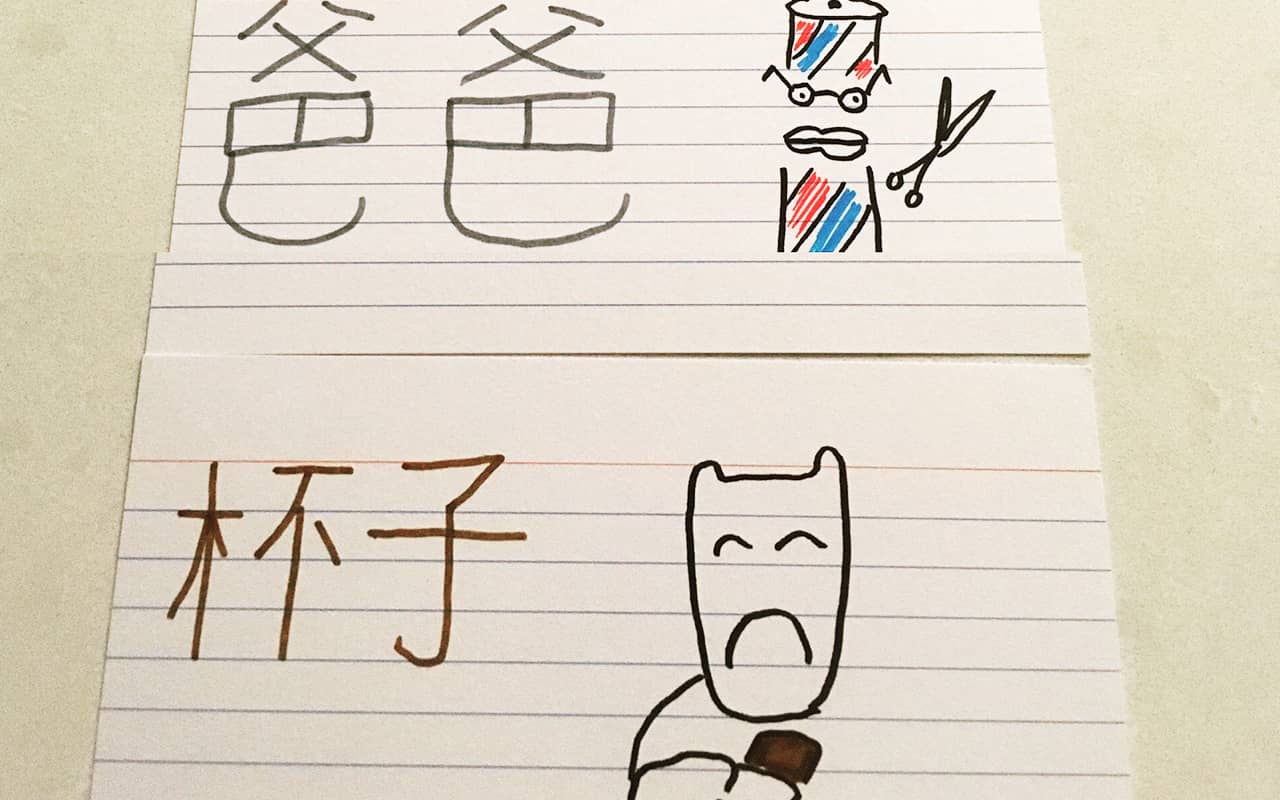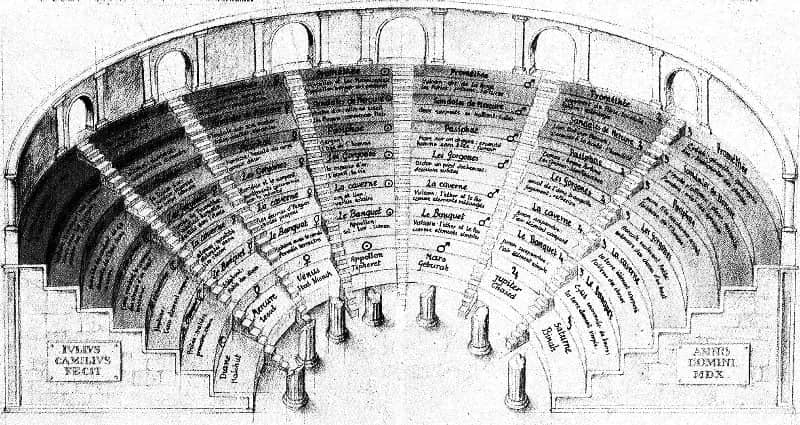
After all, few things are more frustrating than failing exams, struggling to learn new languages and forgetting important names.
Worse, there’s all the time that gets wasted on checking your calendar or train tickets over and over again just to recall simple numbers.
On the one hand, some of these issues are common and come from completely normal memory “lapses.”
However, even when dealing with causes of forgetting that make sense, you can make things better.
How? In many cases it comes down to practicing some simple memory skills.
And using the ones you’ll discover on this page, I’ll help you improve your ability to recall learned information like this (and more) in the future.
How do I know?
I used memory techniques to sharpen my mind during graduate school. Then I used the techniques to learn languages, especially when teaching at a university in German. Later, I gave a presentation in China about memory and rapidly learned enough to enjoy some small talk.
So let me ask you this?
Wouldn’t it be great if you could confidently recall your credit card number without digging it out of your wallet every time you made an online purchase? Or address your sister’s anniversary card without referring to her contact info (again)?
Ready?
Let’s dive in.
9 Memory Skills to Help Learning “Stick”
Authors and cognitive scientists, Peter Brown, Henry Roediger, and Mark McDaniel reveal their evidence-based strategies of “the science of successful learning” in their self-help book entitled Make It Stick.
Although their strategies take slightly more effort to practice, research shows that you’ll significantly change your ability to learn and remember. It really comes down to understanding how your memory works and then acting in accordance.
A lot of people refuse to accept how their memory works, however. They often hope and wish and pray for some other way to learn faster and remember more.
But it only stands to reason that your ability to recall information depends a lot on how you learned it in the first place. Whether you’re studying for school, prepping for a trip to a foreign country, or navigating the demands of a new career, powerful learning techniques will help you remember and even master new information.
Specifically, these learning skills focus on improving semantic memory, which is your knowledge and capacity to recall that knowledge from long-term storage in your brain.
Of course, there are several ways to learn, but doesn’t it make sense to leverage the most effective techniques to build your knowledge? Let’s explore the best go-to memory improvement skills that’ll renew your trust in your memory and rebuild your self-confidence.
To introduce you to these memory skills, please do more than merely read about them. Put them into practice using this specific form of practice designed for helping you learn and master new talents like world class memory.
Ready? (Hint: No fluorescent markers required!)
1. Retrieval Practice
The process of deliberately recalling information or knowledge from your memory is called retrieval. You truly gain a better understanding of the material when you’re forced to pull it from memory without a prompt.
Retrieval boosts learning by strengthening our neural pathways and longer-term memory retention.
Instead of re-reading text or reviewing a diagram, retrieval learning will force you to pull the information from your brain, subsequently reinforcing the memory. When studying, learning tools like memory practice problems or flashcards strengthen your learning through retrieval.
Why do flashcards help you improve retrieval?
When created correctly, they give you what scientists call active recall. Although this approach does require you to challenge yourself a bit, it’s well worth it if you want to learn and understand information better, while ensuring that you remember it.
2. Elaboration Practice
Have you ever noticed how easy it is to remember someone with the same first name as your brother or sister? It’s likely that elaboration helped you remember.
When you learn a new concept by associating it in terms you already know, you’re elaborating. You learn and build your knowledge by connecting new information to concepts that are already familiar, which creates the connections in your brain that help you remember it later.
Elaborative encoding is a helpful way to remember the names of people you meet. A simple example is to associate the name of the new acquaintance with someone you already know with the same name, like a family member or schoolmate.
3. Interleaving Lets You Skip Around & Still Remember More
You might think that your brain would be challenged to learn several mixed but related topics together. It’s also natural to think that it’d be easier to learn each topic separately. But research has shown that the in-depth memory strategy of interleaving concepts requires more effort to learn, resulting in better memories and the ability to solve problems.
This learning technique leverages our innate tendency to compare and contrast concepts and is particularly helpful in academic learning like math and history, developing interrelated skills like cooking and gardening.
For example, science teachers interleave the concepts of weight, mass, volume and density with the various units of measure because it provides students opportunities to better learn and discern the differences between similar yet distinct terms.
4. Generation
The generation effect is a learning technique that enhances your ability to remember information by predicting an outcome prior to actually reading it. This is a particularly beneficial learning strategy in reading comprehension.

There’s no clear learning benefit of being right or wrong. (Gasp!) Instead, the generation of your theory provides the foundation for supporting knowledge and memorable information, particularly when corrective feedback is provided.
5. Reflection
Reflection is nearly the opposite of generation, whereby you look back on what you’ve learned and how you learned it. This technique promotes a conscious “replay” of the learning experience, which enhances encoding and strengthens memory.
Journaling is an excellent memory skill in the form of reflection learning. Studies show that when you take time to step back and log a “post-mortem” review of your learning venture, you benefit from your experience and subsequently increase your performance in the future.
When reflecting, take a few moments to contemplate responses to questions like:
- What worked well?
- What did I miss?
- What is this similar to?
- Where can I improve?
- What strategies can I engage to improve my outcome?
6. Use Mnemonics
In its simplicity, the use of mnemonics is a memory practice that uses a device or aid to help you remember lists or the order of a group of things.

Perhaps you’ve used the knuckle mnemonic trick to help you remember months of the year that have 31 days. And, when you learned to spell as a child, your teacher probably introduced you to spelling mnemonics like:
- “A friend is a friend right to the end”
- “rhythm helps your two hips move” or
- “an island is land surrounded by water.”
Remember the mnemonic phrase “May I have a large container of coffee, cream and sugar?” to help you recall the first digits of pi. The number of letters in each word corresponds to the digit of pi (3.1415926535).
Practice creating and using quick and easy mnemonics to help you recall useful information in the future. Similar to the coffee phrase above, you could easily create a mnemonic device to remember your credit card number!
To learn longer lists or complex number memorization, the Pegword System and the Major Method are mnemonic techniques that are commonly used in conjunction with other memorization skills and methods.
Don’t worry if you don’t feel creative or visual. These visualization exercises will help you easily start using mnemonics quickly. You can also explore the way I teach image streaming, which is geared towards those with memory improvement goals.
7. Calibration
Calibration is the memory skill of actively checking in with yourself and seeking out feedback or guidance on what you need to learn.
Structured education offers such calibration opportunities frequently, through administered quizzes or tests. Test results help students confirm that they’ve learned course material (or that their learning was deficient at some level). Cumulative test results also help teachers understand the efficacy of their instruction and provide insight on how they can help their students learn better.
But, tests aren’t the only way to get back on track. Check out our self-calibration tips that will work to refocus yourself so that you can concentrate on the task at hand.
8. Magnetic Mind Mapping
Mind maps are structured drawings that depict relationships between concepts. In place of traditional written notes or concept maps, they provide a visual representation of related information, such as book summaries or lecture topics.
Learn how to create mind maps to help clarify a particular topic or to express concepts or problem-solve in a group setting. The creative activity of drawing relationships with different colors or images parallels your brain’s thought processes and is shown to be an effective way of learning. It also makes for great sensory memory exercise.
Although the term visualization implies “seeing in your mind”, this technique consciously engages all of your senses (and more) to help you remember things. In other words, you create mental images of things you want to remember by thinking about them as a multi-sensory entity instead of a simple visual picture. This technique is beneficial for remembering names on the fly. The more wildly creative your mental “images” are, the better.
Interested? Check out these visualization exercises to get you started on visualization using Magnetic Modes. For more practice, request my Free Memory Improvement Kit.
9. The Magnetic Memory Palace
A Memory Palace is a memorization skill and method that’s used to store a large amount of information. The method itself leverages a combination of many of the memory techniques we explored here in tandem with locations that you create in your mind.

My Magnetic Memory Method leverages the combination of Memory Palaces, Magnetic Modes, the Major Method, Pegword System (and more) to learn and memorize large amounts of information.
Ready To Benefit From Your Newfound Memory Skills?
Are these memory skills the magic potion to your memory woes?
Like all skills, these memorization skills require some practice, polish and fine-tuning to truly enhance your ability to learn. However, by consciously applying these skills to your learning efforts, you’ll quickly realize surprising results that’ll boost your confidence in everyday life and help you perform better in school or at work.
Now, who isn’t down for that?
I hope you are, and if so, here’s where you can get my free memory improvement course:
It gives you four free videos and worksheets that walk you through the ultimate memory skill: The Memory Palace technique.
As mentioned above, all these skills take is a bit of deliberate practice.
You can do it.
And you’ll love just how quickly you can learn once you are on the path to better memory.
Related Posts
- Stoic Secrets For Using Memory Techniques With Language Learning
Christopher Huff shares his Stoic secrets for using memory techniques when learning a language. You'll…
- The Memory Book By Harry Lorayne and Jerry Lucas
The Memory Book is a classic. Here's a quick rundown of its strongest points and…
- The German Professor Who Defends Memory Techniques for Language Learning
This professor defends memorization techniques for learning foreign languages and has the science to prove…






2 Responses
Which memory books come with citations in a reference section so the reader knows the source of the suggested techniques? Does your book have citations?
Thanks for your question.
All of my books refer to the sources of these techniques. The Victorious Mind has the most extensive amount of citations overall.
Most books on memory point to Rhetorica Ad Herennium as one of the earliest sources, and it is well worth reading.
The Memory Code by Lynne Kelly goes deeper into the prehistoric origins, so you may want to check that out too.